“A woman gets to decide whether she will reproduce”
Hundreds gathered at the steps of the Capitol in an emotionally charged protest against the Supreme Court’s decision to overturn Roe v. Wade.
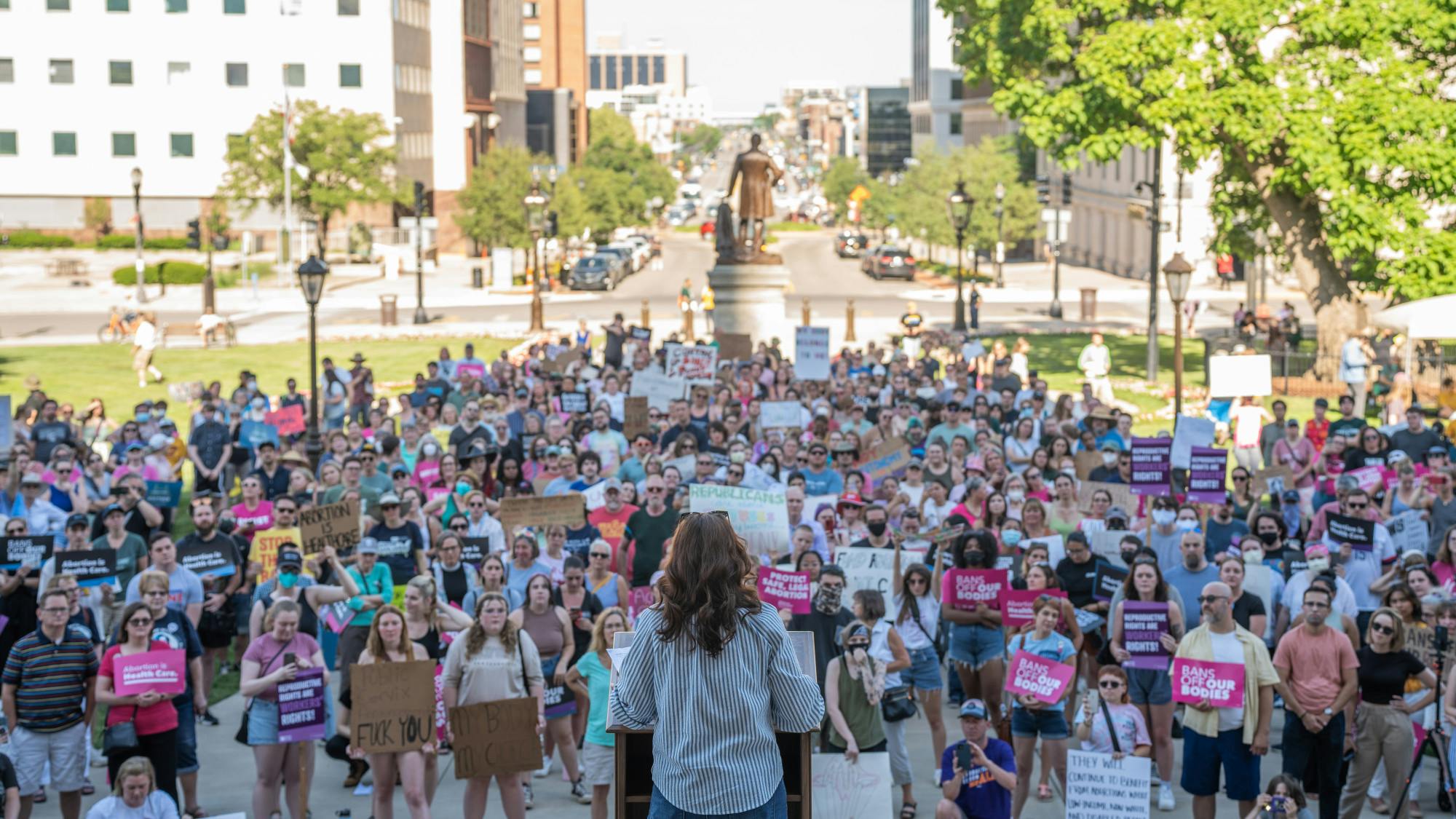
Gov. Gretchen Whitmer addresses abortion-rights protesters at the Michigan State Capitol on June 24, 2022. Abortion-rights protesters gathered on the Michigan State Capitol lawn after the Supreme Court overturned the constitutional right to an abortion, decided by Roe v. Wade in 1973, through their decision in the Dobbs vs. Jackson Women's Health Organization case.
“A woman gets to decide whether she will reproduce”
Hundreds gathered at the steps of the Capitol in an emotionally charged protest against the Supreme Court’s decision to overturn Roe v. Wade.
Organized by Bans off our Body, a Planned Parenthood organization, Rep. Lori Pohutsky, Sen. Curtis Hertel, Chief Medical Officer Dr. Sarah Wallet and Gov. Gretchen Whitmer were speakers at the event, calling the day “a dark day” in American history.
Though many on the Capitol’s lawn shed tears, there was a focus on taking action rather than despair.
“We cannot stew in the moment,” Whitmer said. “We must turn it into mobilization and action.”
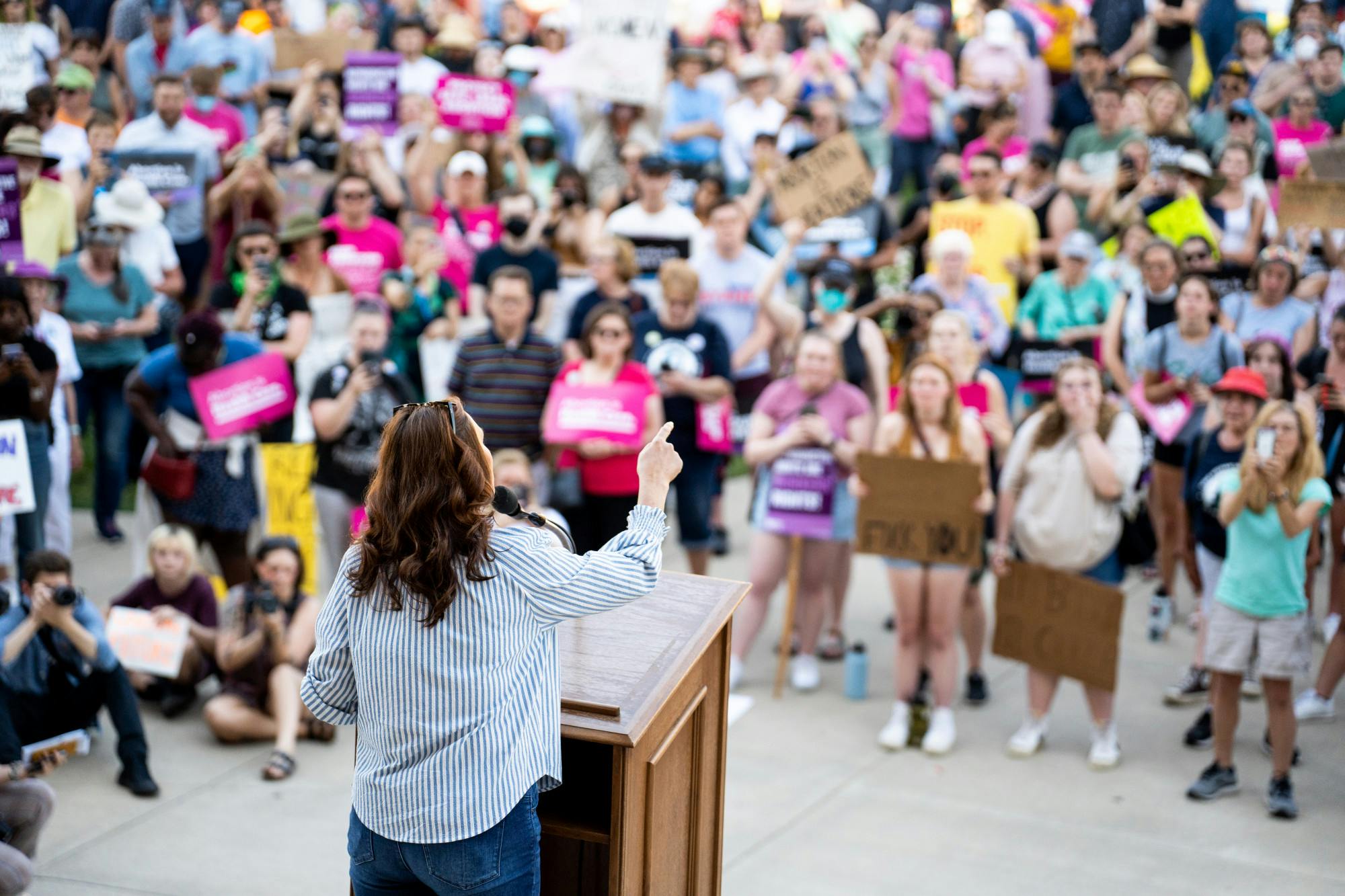
“I want us to take the tiniest bit of comfort in the fact that we have been prepared for this day,” Pohutksy said. “There are already strategies in the works to mitigate this disastrous Supreme Court decision.”
Speakers also encouraged people to vote.
“I know everyone is tired of being told to vote …without a democratic majority in the legislature, we are going to have to continue playing defense,” Pohutsky said.
Protesters in pink moved through the crowds, urging people to sign a petition to get abortion rights on the ballot for midterm elections. While abortion is still currently legal in Michigan due to a temporary injunction against a 1931 law that banned it completely, protesters hope to codify it into Michigan law.
Many protesters have done this before.
“We did this 50 years ago, and we’ll do it until we die,” protester Maggie Bayers said.
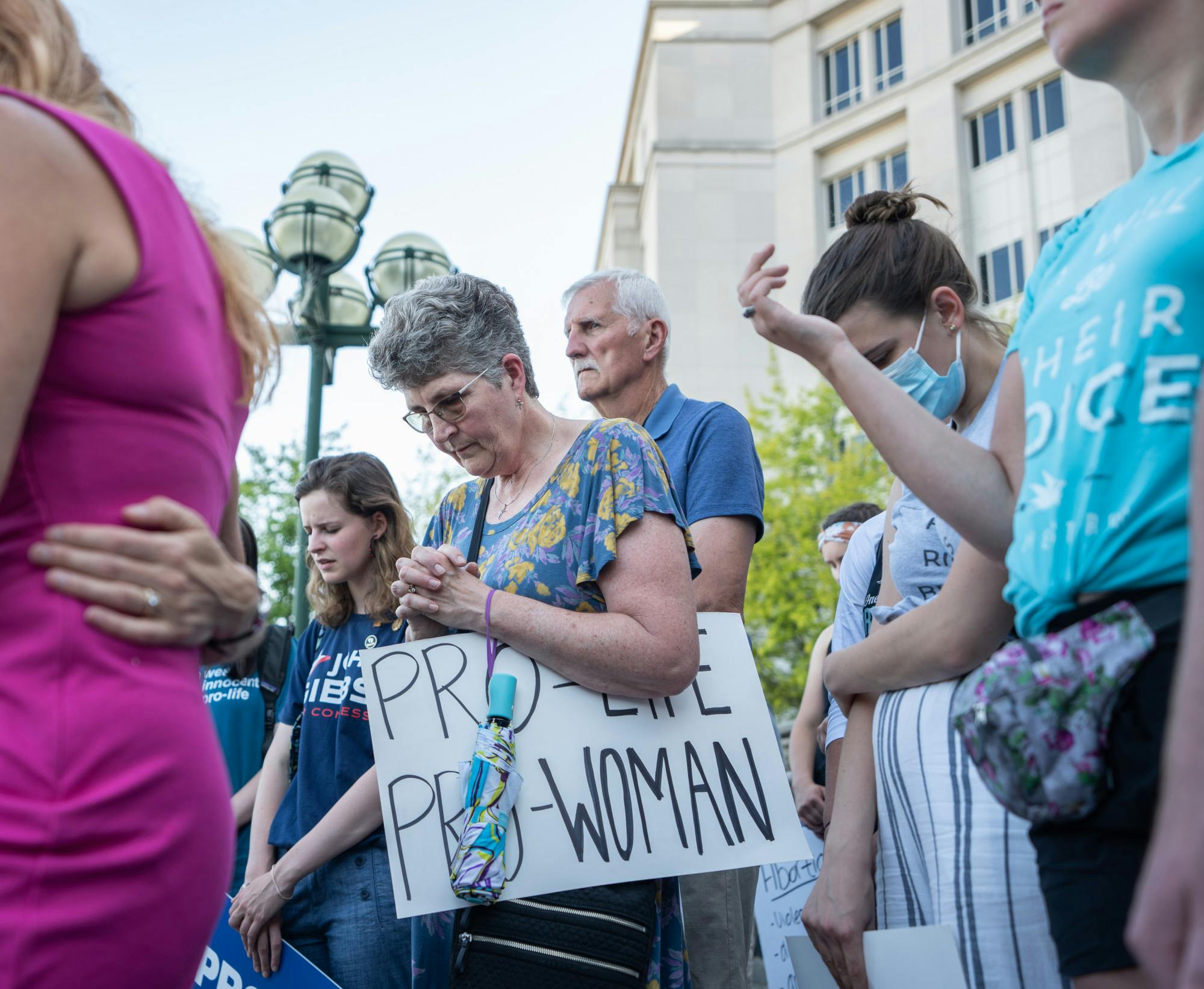
A woman bows her head in prayer outside the Michigan Hall of Justice as anti-abortion supporters gathered to celebrate the overturning of Roe v. Wade and rally to continue the fight to end abortion on June 24, 2022.
For Bayers, and many women, this fight is personal. In the 70s, Bayer's then-15-year-old sister was raped and had to fly to New York to get a legal abortion. Today, Bayers said she fights for all women.
“A woman gets to decide whether she will reproduce,” she said. “Nobody, not a rapist, not your husband, not the court, decides.”
Another protester, Joni Holmgren, said she went to her first abortion rights protest in 1971.
“I was 16 years old,“ Holmgren said. “50 years later, I'm here again, not happy.”
Protester Pat St. George said she “dragged” her husband to the rally, but for them, abortion rights are an important issue.
“I'm old enough to remember when abortions were illegal,” he said. “And no, I'm not a big fan of abortion, but I’m not forcing moral issues in other people's lives.”
St. George had a friend who had an abortion before it was legal, and as a result, was no longer able to have children.
Support student media! Please consider donating to The State News and help fund the future of journalism.
“I don't think abortion is an easy choice for anybody,” she said. “So it should be safe. It should be sterile. It should be legal.”
“Every human life is inherently valuable”
Meanwhile, at the Hall of Justice, Protect Life Michigan played “Happy” by Pharell over a speaker as attendees at the celebration rally gathered to thank the Supreme Court for their decision and to pray, sing and discuss how to move forward.
Save the 1 speaker Rebecca Kiessling shared her story to start off the event. Conceived by rape, Kiessling’s birth mother planned to terminate her pregnancy. However, it was illegal at the time, and Kiessling’s birth mother decided the risks were too high.
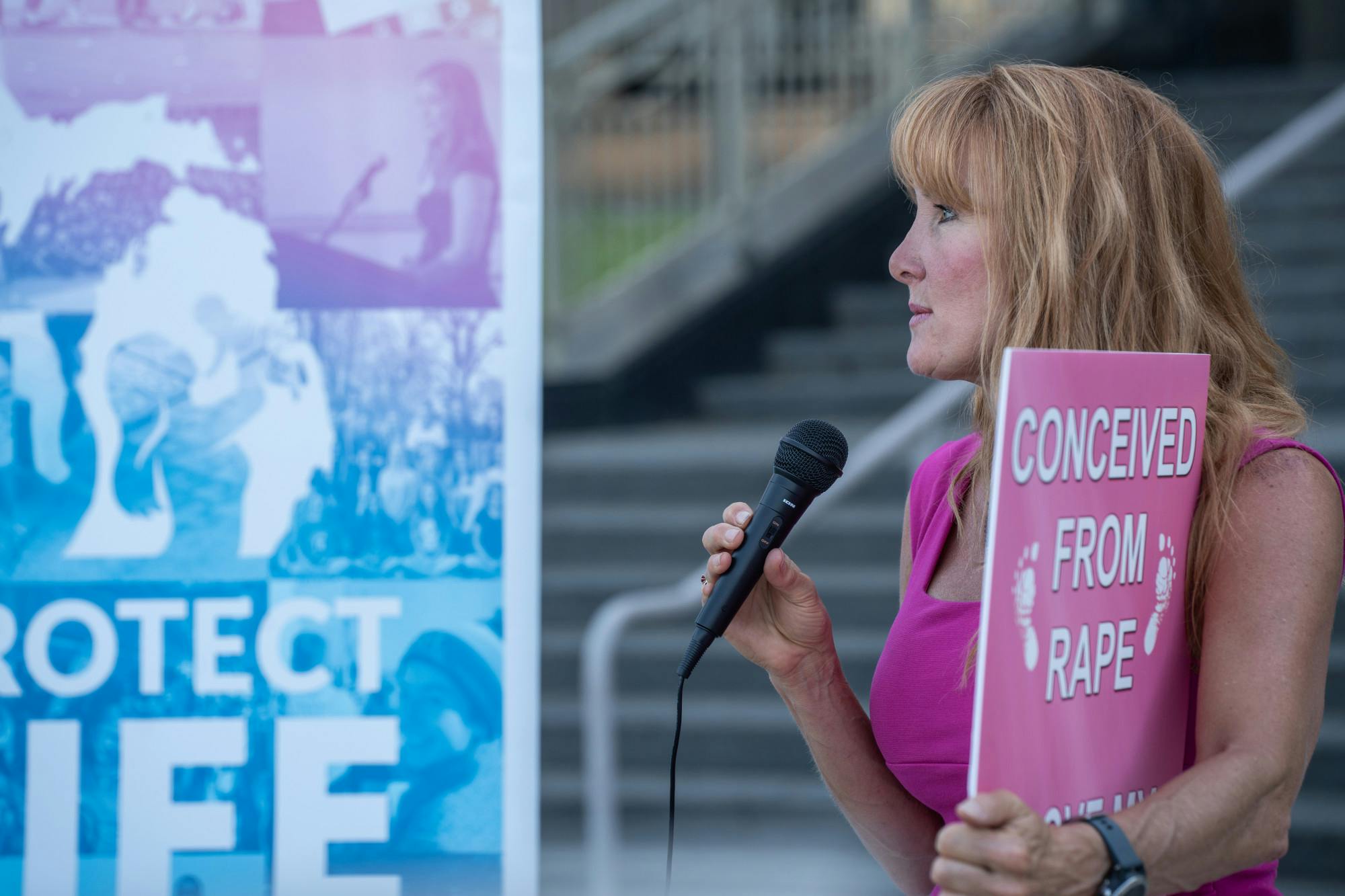
Rebecca Kiessling talks about her experience as a child born from rape outside the Michigan Hall of Justice as anti-abortion supporters gathered to celebrate the overturning of Roe v. Wade and rally to continue the fight to end abortion on June 24, 2022. She said her mother considered getting an abortion, but couldn't because Roe v. Wade wasn't in place.
Kiessling had the chance to meet her birth mother at 19, and while her birth mother originally said she would’ve maintained her decision to get an abortion had it been legal, now, the two have a good relationship.
“She said she was pro-choice, that it should have been her right,” Kiessling said. “And even if she had to do it over again she would have aborted me, but six years later she changed. This is not a fictitious theoretical, philosophical legal argument talking about just some fetus. There are real people who are affected— real people, real lives who were saved before Roe vs. Wade. And now they are real lives, people who will be born because they're gonna be spared the horror of abortion.”
Equal Rights Initiative speaker Emily Albright also attended the celebration.
“Legal abortion is not gone,” Albright said. “We all know this. And neither is the bitter divide among Americans about whether or not it should be a human right to kill other humans. In this moment of celebration, we know that this is far from over.”
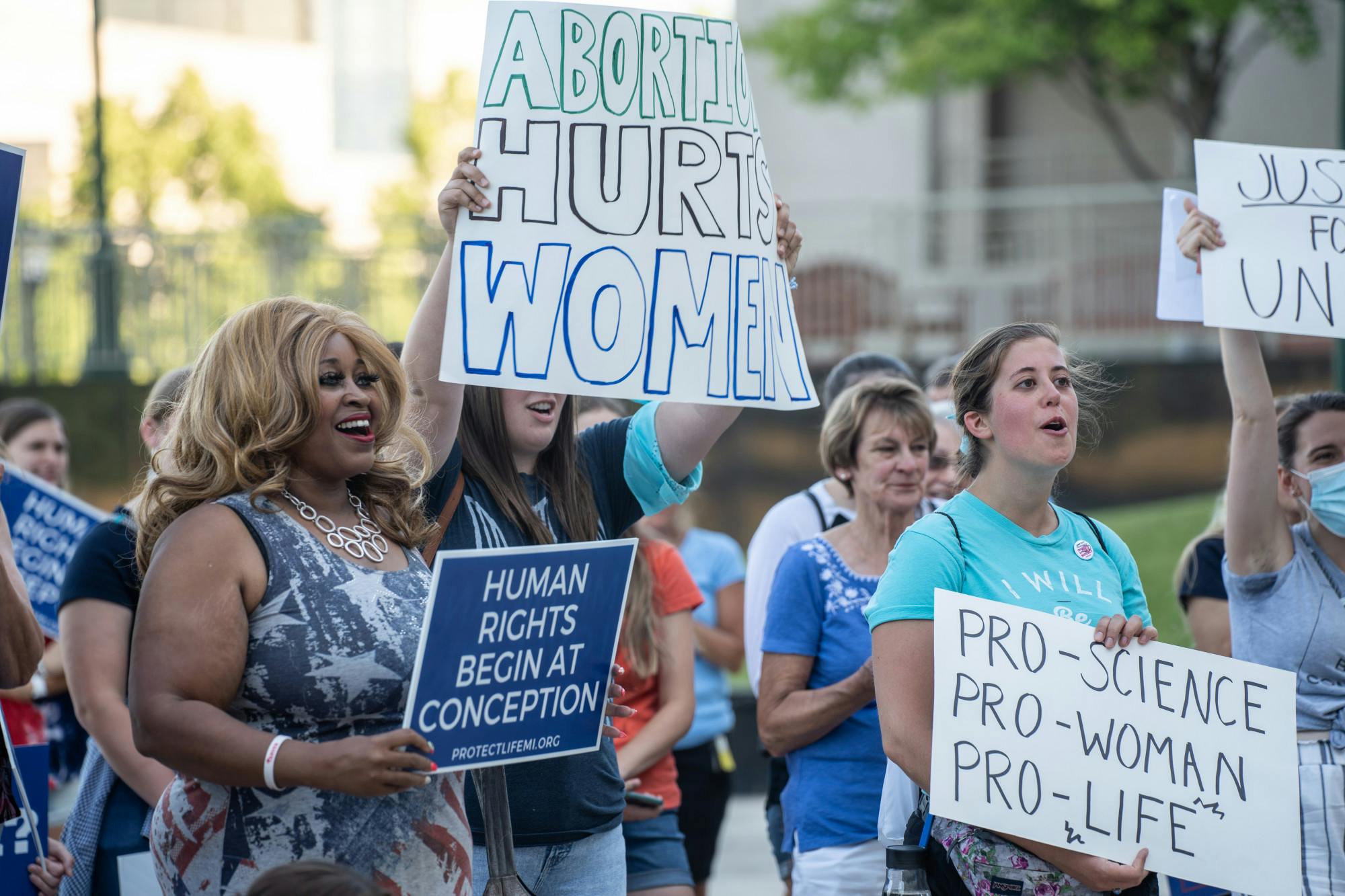
Anti-Abortion supporters gather outside the Michigan Hall of Justice to celebrate the overturning of Roe v. Wade and rally to continue the fight to end abortion on June 24, 2022.
She encouraged attendees to continue “sidewalk counseling” at clinics, where Protect Life advocates attempt to convince people going into abortion clinics not to get an abortion. Additionally, Albright told attendees to have conversations to change individual minds about abortion and advocated for a long-term infrastructure that supports the “pro-life” initiative.
“Things like increasing access to Medicaid funding for prenatal delivery and postpartum expenses,” Albright said. “I want to expand the Child Tax Credit … and I want to increase access to affordable childcare options … We need to get … both maternal and paternal paternity leave. And we need to be getting rid of this problem where families have to have two incomes in order to survive. I want families to be able to do what is best for them and not feel forced into getting an abortion or not feel forced (to) not have children because they feel like they can't afford it.”
For attendee Sue Shirkey, Friday was meaningful, but she hopes to see more.
“Being an adopted person, I am very grateful that my unwed mother gave me life,” she said. “I feel a responsibility because I was given life that I want to give other unborn babies a chance.”
Shirkey said she hopes that in the state and in the nation, there is more support for low-income pregnancies.
While Bans off Our Bodies had many people who had been fighting for Roe v. Wade for decades, Protect Life Michigan also had several people who had been fighting against it for decades.
Linda and Dennis Hrcka have been advocating against abortion rights since 1974, and are excited “to pass the torch.”
“We’ve been involved with this for a long time, so it’s wonderful to see this terrible decision being overturned, and now we have an opportunity to make change,” Linda said.

James Muffett leads anti-abortion supporters in prayer outside the Michigan Hall of Justice as anti-abortion protesters gathered to celebrate the overturning of Roe v. Wade and rally to continue the fight to end abortion on June 24, 2022.
"I've been a Pro-Life advocate for over 40 years," Muffett said. "This is a day I never thought would happen."
The Hrckas are passing the torch to people like Lily Erickson, a Hillsdale alumna that found her passion for the anti-abortion movement while in college.
“Every human life is inherently valuable,” Erickson said. “Every human being has inherent dignity. And that deserves to be protected from the moment of conception until the moment of natural death. So obviously, the fight is not over.”